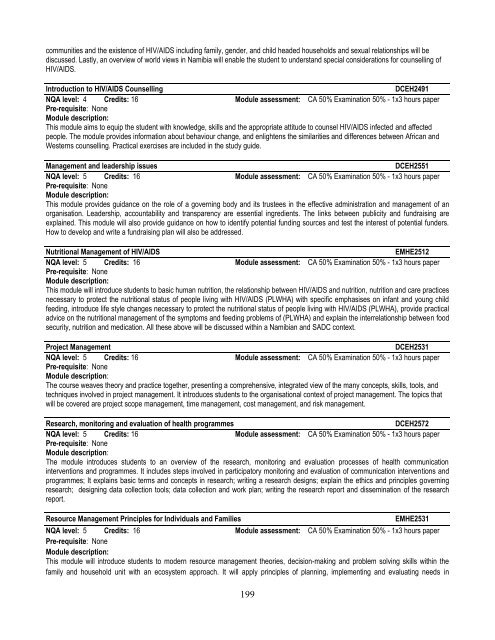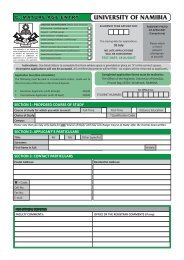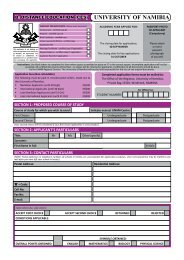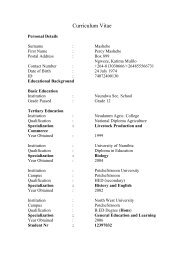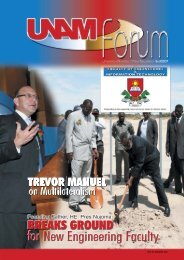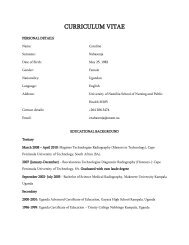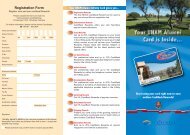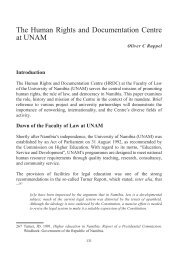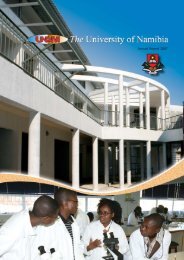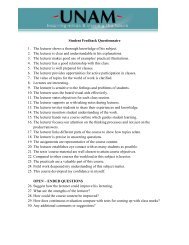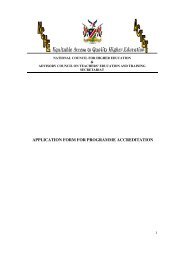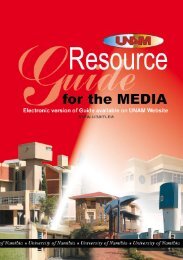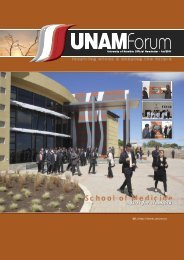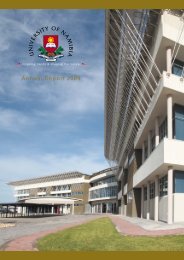UNIVERSITY OF NAMIBIA CENTRE FOR EXTERNAL STUDIES ...
UNIVERSITY OF NAMIBIA CENTRE FOR EXTERNAL STUDIES ...
UNIVERSITY OF NAMIBIA CENTRE FOR EXTERNAL STUDIES ...
Create successful ePaper yourself
Turn your PDF publications into a flip-book with our unique Google optimized e-Paper software.
communities and the existence of HIV/AIDS including family, gender, and child headed households and sexual relationships will bediscussed. Lastly, an overview of world views in Namibia will enable the student to understand special considerations for counselling ofHIV/AIDS.Introduction to HIV/AIDS CounsellingDCEH2491NQA level: 4 Credits: 16 Module assessment: CA 50% Examination 50% - 1x3 hours paperPre-requisite: NoneModule description:This module aims to equip the student with knowledge, skills and the appropriate attitude to counsel HIV/AIDS infected and affectedpeople. The module provides information about behaviour change, and enlightens the similarities and differences between African andWesterns counselling. Practical exercises are included in the study guide.Management and leadership issuesDCEH2551NQA level: 5 Credits: 16 Module assessment: CA 50% Examination 50% - 1x3 hours paperPre-requisite: NoneModule description:This module provides guidance on the role of a governing body and its trustees in the effective administration and management of anorganisation. Leadership, accountability and transparency are essential ingredients. The links between publicity and fundraising areexplained. This module will also provide guidance on how to identify potential funding sources and test the interest of potential funders.How to develop and write a fundraising plan will also be addressed.Nutritional Management of HIV/AIDSEMHE2512NQA level: 5 Credits: 16 Module assessment: CA 50% Examination 50% - 1x3 hours paperPre-requisite: NoneModule description:This module will introduce students to basic human nutrition, the relationship between HIV/AIDS and nutrition, nutrition and care practicesnecessary to protect the nutritional status of people living with HIV/AIDS (PLWHA) with specific emphasises on infant and young childfeeding, introduce life style changes necessary to protect the nutritional status of people living with HIV/AIDS (PLWHA), provide practicaladvice on the nutritional management of the symptoms and feeding problems of (PLWHA) and explain the interrelationship between foodsecurity, nutrition and medication. All these above will be discussed within a Namibian and SADC context.Project ManagementDCEH2531NQA level: 5 Credits: 16 Module assessment: CA 50% Examination 50% - 1x3 hours paperPre-requisite: NoneModule description:The course weaves theory and practice together, presenting a comprehensive, integrated view of the many concepts, skills, tools, andtechniques involved in project management. It introduces students to the organisational context of project management. The topics thatwill be covered are project scope management, time management, cost management, and risk management.Research, monitoring and evaluation of health programmesDCEH2572NQA level: 5 Credits: 16 Module assessment: CA 50% Examination 50% - 1x3 hours paperPre-requisite: NoneModule description:The module introduces students to an overview of the research, monitoring and evaluation processes of health communicationinterventions and programmes. It includes steps involved in participatory monitoring and evaluation of communication interventions andprogrammes; It explains basic terms and concepts in research; writing a research designs; explain the ethics and principles governingresearch; designing data collection tools; data collection and work plan; writing the research report and dissemination of the researchreport.Resource Management Principles for Individuals and Families199EMHE2531NQA level: 5 Credits: 16 Module assessment: CA 50% Examination 50% - 1x3 hours paperPre-requisite: NoneModule description:This module will introduce students to modern resource management theories, decision-making and problem solving skills within thefamily and household unit with an ecosystem approach. It will apply principles of planning, implementing and evaluating needs in


